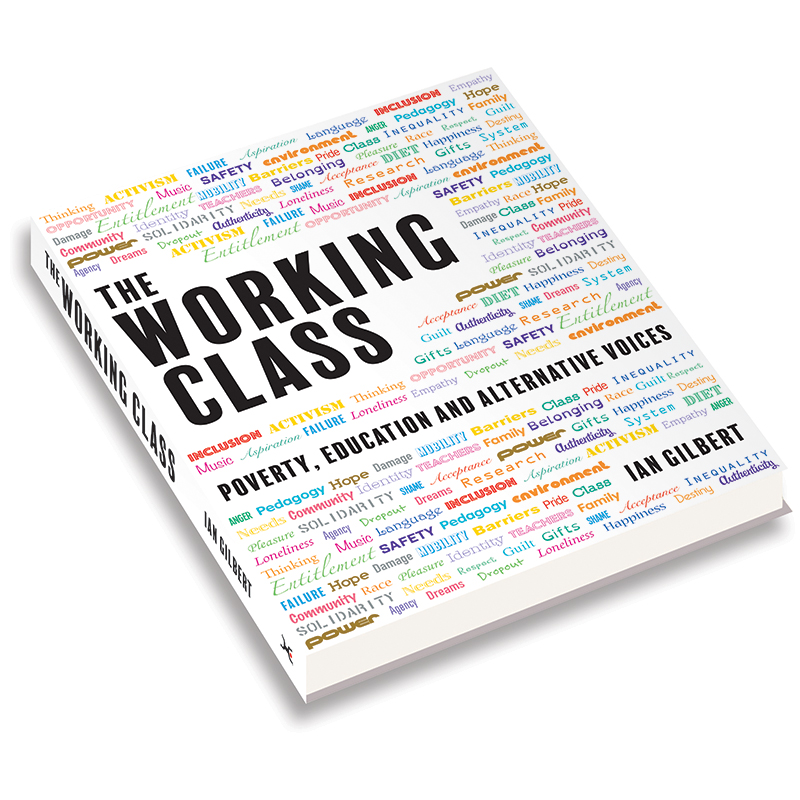Ten Questions From The Working Class
Ten questions to help schools think differently about the achievement gap, drawn from the alternative narratives put forward in our book The Working Class.
The main purpose in creating the book The Working Class was to change the narrative around 'the feckless poor' and 'level playing fields' and other such rubbish.
As with everything in education and beyond, there is always another way of looking at things, different perspectives to consider and alternative voices to hear.
When Ian Gilbert was asked to put together a 90-minute webinar for teachers in a Midlands MAT recently, he created ten questions to go with each of the ten 'alternative narratives' that emerged from the book to act as points of reflection and provocations to thinking.
There are no easy answers to any of these questions - but they still need asking if we are serious about supporting every child who walks through the school gates.
Alternative Narrative 1. It is not and never has been a level playing field
Q1: How do you take into account the effects of being born into and growing up in poverty in your school?
Alternative Narrative 2. Poverty is a neurological issue too
Q2: How do you accommodate and seek to counterbalance the neurological effects of being born into and growing up in poverty in your school?
Alternative Narrative 3. Inclusion is as much about adapting the school to the child as it is about adapting the child to the school
Q3: How have you adapted your school to best support children who are growing up in poverty?
Alternative Narrative 4. The purpose of education is not to make everyone middle class
Q4: What does the make up, culture and day-to-day running of your school reflect in terms of class?
Alternative Narrative 5. Never trust the results of a school that excludes more than it includes
Q5. Are you implementing an educational form of social and ethnic cleansing through your school polices and practices?
Alternative Narrative 6. Resilience in the face of adversity is important, but so is changing the causes of adversity
Q6. How are you developing confidence, belonging and individual agency for all young people in your school?
Alternative Narrative 7. My culture may not be your culture, but it is still a culture
Q7. How are you ensuring that every child – and their family, their ancestry, their heritage – is appreciated for the cultural, social and actual wealth they have brought both to the community and the wider world, that children are valued for what they bring, not what they discard?
Alternative Narrative 8. 'No excuses' for all means 'No chance' for some
Q8. Is your current behaviour policy fair?
Alternative Narrative 9. It is always more complicated than anyone says it is
Q9. As a school and as an individual, how can you improve your understanding of the complexities inherent in the issue of education and poverty?
Alternative Narrative 10. There is always another way
Q10. As an individual and as a school, what might you do differently?
We hope these questions provoke debate and action whatever your school setting and let us know if you want Ian or any of our Associates to lead any work on the topic in your school.
*You can see the bigger picture with the book The Working Class, described as a 'game changer' and available for 20% off with free UK p+p when you use the code 'ITL20' at checkout from the Independent Thinking Press store.

To find out more about booking Ian Gilbert for your school, college or organisation call us on 01267 211432 or drop us an email on learn@independentthinking.co.uk.
Enjoy a free no-obligation chat.
Haggle a bit. Make a booking.
Call us on +44 (0)1267 211432 or drop us a line at learn@independentthinking.co.uk.

About the author
Ian Gilbert
Ian Gilbert is an award-winning writer, editor, speaker, innovator and the founder of Independent Thinking. Currently based in Finland, he has lived and worked in the UK, mainland Europe, the Middle East, South America and Asia and is privileged to have such a global view of education and education systems.